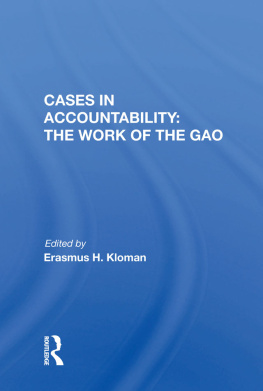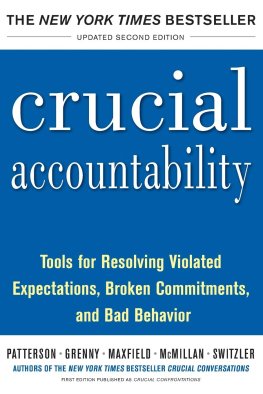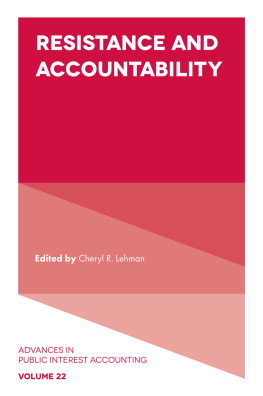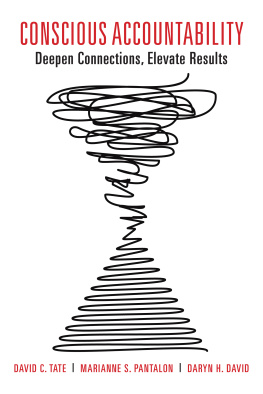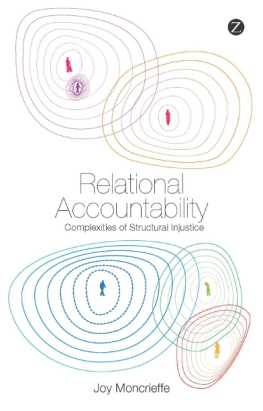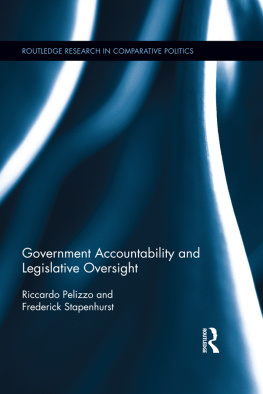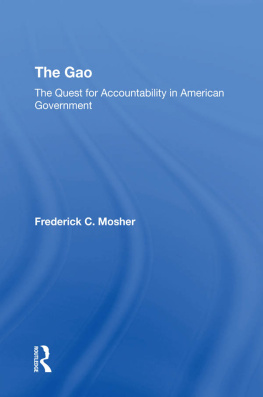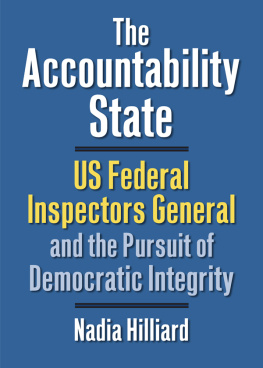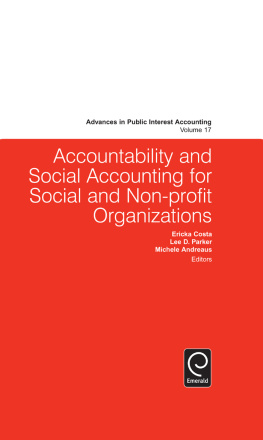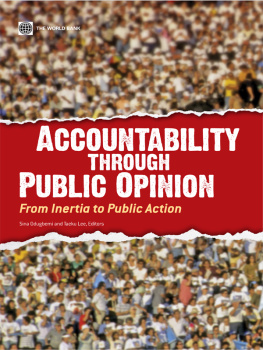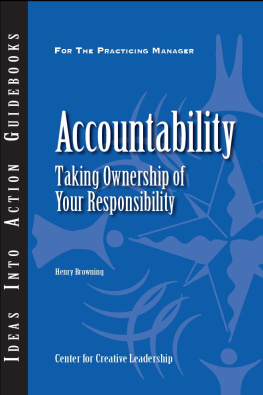First published 1979 by Westview Press, Inc.
Published 2018 by Routledge
52 Vanderbilt Avenue, New York, NY 10017
2 Park Square, Milton Park, Abingdon, Oxon OX14 4RN
Routledge is an imprint of the Taylor & Francis Group, an informa business
Copyright 1979 Taylor & Francis
All rights reserved. No part of this book may be reprinted or reproduced or utilised in any form or by any electronic, mechanical, or other means, now known or hereafter invented, including photocopying and recording, or in any information storage or retrieval system, without permission in writing from the publishers.
Notice:
Product or corporate names may be trademarks or registered trademarks, and are used only for identification and explanation without intent to infringe.
Library of Congress Cataloging in Publication Data
Main entry under title:
Cases in accountability.
1. United States. General Accounting Office. 2. Finance, PublicUnited StatesAccountingCase studies. I. Kloman, Erasmus H. II. United States. General Accounting Office.
HJ9802.C37 353.007'232 78-27099
ISBN 0-89158-395-5
ISBN 0-89158-494-3 pbk.
ISBN 13: 978-0-367-02080-4 (hbk)
ISBN 13: 978-0-891-58494-0 (pbk)
Contents
, Frederick C. Mosher
, Erasmus H. Kloman
Part 1
Program Results
, John Manchir, Larry A. Goldsmith, and Erasmus H. Kloman
, Erasmus H. Kloman
, Jeffrey L. Jacobs
, Nancy G. Deck
, George A. Sousa
, Erasmus H. Kloman
, Peter J. Lemonias
, Thomas C. Perry
Part 2
Economy and Efficiency
, Robert E. Shelton
, Michael Brostek
, Frederick C. Mosher
, Thomas C. Perry
Part 3
Accounting and Financial
, Gerald C. Schulsinger and Thomas C. Perry
, Gerald C. Schulsinger and Thomas C. Perry
, John F. Simonette
, Darby W. Smith
, Thomas C. Perry
Part 4
Legal
, Robert F. Stephens, Ronald Wartow, and Erasmus H. Kloman
, Rollee H. Efros
Part 5
Special Studies
, William C. Oelkers and Erasmus H. Kloman
, William M. Clevenger, Natwar M. Gandhi, and Ellen P. Roche
, Nancy G. Deck
, Sam Pines
Part 6
Mini-Cases
, Thomas C. Perry
, Thomas C. Perry
, Thomas C. Perry
, Thomas C. Perry
, Jeffrey L. Jacobs
Frederick C. Mosher
During the winter of 1976-1977, on the initiative of Comptroller General Elmer B. Staats, the General Accounting Office (GAO) entered into an agreement with the National Academy of Public Administration (NAPA) to assist in the preparation of a history and current description of the GAO. Staats engaged me to direct the project and be its principal author, and the GAO assigned Mr. Jeffrey L. Jacobs, a GAO official, to assist me in the task. In accordance with its normal practice in the conduct of its studies, the academy designated a panel of distinguished citizens, representing a variety of experiences and professional perspectives, to guide, advise on, and generally superintend the project. The ten-member panel included no GAO employee although a few of the group had, from time to time, served it as consultants or members of advisory boards.
At its first meeting, members of the panel suggested, discussed, and then urged expanding the project to include the preparation and publication of specific case studies that would illustrate the nature, the range, and the problems of the GAO's work. The proposal was approved by the leadership of both NAPA and the GAO, and this volume is the product of those decisions. It is a companion of the book entitled The GAO: The Quest for Accountability in American Government, which is being published simultaneously. The two volumes are interdependent and mutually supportive. To minimize repetition, the casebook refers to the general volume for information about the development and nature of the processes the cases illustrate, and the general volume is sprinkled with references to the cases to exemplify the developments and problems with which it deals.
All of us who have been involved in this enterprise were fortunate that the academy assigned Dr. Erasmus H. Kloman, a senior member of its staff with broad and varied experience in public affairs, to superintend the development of this casebook. He had previously prepared a number of case studies, and was well qualified to assume responsibility for planning, organizing, supervising, and editing these cases. Because of the interdependence of the two books, he worked in close collaboration with the rest of usthe authors and critics of the cases, the panel, and particularly with Jeffrey Jacobs, who has been an invaluable associate in all respects of the study.
The cases that follow are intended to be broadly representative of the GAO's work, and in the main I think they are. There may be some bias in the direction of the more significant, the more newsworthy, and the more successful. But in these respects, I doubt that they are as vulnerable as most other case studies about government.
The basic objectives and criteria in preparing these cases were that they be factual and descriptive, not evaluative; concise; illustrative of the variety of GAO projects; and impersonal, with minimal reference to individual participants and relationships among them. Most of the cases are organized in three main parts. The first concerns the background and nature of the problem and the sources and reasons for the GAO study. The second is a description of the study itselfhow it was planned and organized, how it was conducted, and its major findings and recommendations. The third is directed to relevant developments subsequent to the GAO study, whether or not they are consequences of the GAO's work.
These cases were originally planned to exemplify the nature of the work of the GAO. I now think that they have a much more extensive value. They provide information and raise questions about the whole system of American governmentthe relations of the public and private sectors, the separation of powers, intra- and intergovernmental relationships, the relationships of politics with factual and analytic studies, and many other broad problems. I know of few works that provide more information and that provoke more insights about problems like these than this collection of cases.
As indicated earlier, most of the cases in this work were initially written by professionals in the GAO. To them we are especially indebted. We are also grateful for the time and thought of those in the executive agencies and Congress who carefully reviewed and criticized the drafts. Most of all we are indebted to Mary E. Amburgey, who assembled and typed, corrected, and retyped so many manuscripts of cases. Without her, there would be no book.
Frederick C. Mosher
Doherty Professor
Government and Foreign Affairs

